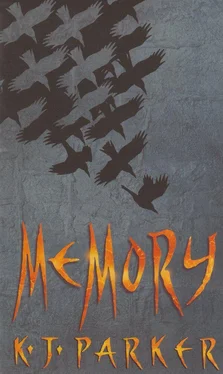K Parker - Memory
Здесь есть возможность читать онлайн «K Parker - Memory» весь текст электронной книги совершенно бесплатно (целиком полную версию без сокращений). В некоторых случаях можно слушать аудио, скачать через торрент в формате fb2 и присутствует краткое содержание. Жанр: Фэнтези, на английском языке. Описание произведения, (предисловие) а так же отзывы посетителей доступны на портале библиотеки ЛибКат.
- Название:Memory
- Автор:
- Жанр:
- Год:неизвестен
- ISBN:нет данных
- Рейтинг книги:5 / 5. Голосов: 1
-
Избранное:Добавить в избранное
- Отзывы:
-
Ваша оценка:
- 100
- 1
- 2
- 3
- 4
- 5
Memory: краткое содержание, описание и аннотация
Предлагаем к чтению аннотацию, описание, краткое содержание или предисловие (зависит от того, что написал сам автор книги «Memory»). Если вы не нашли необходимую информацию о книге — напишите в комментариях, мы постараемся отыскать её.
Memory — читать онлайн бесплатно полную книгу (весь текст) целиком
Ниже представлен текст книги, разбитый по страницам. Система сохранения места последней прочитанной страницы, позволяет с удобством читать онлайн бесплатно книгу «Memory», без необходимости каждый раз заново искать на чём Вы остановились. Поставьте закладку, и сможете в любой момент перейти на страницу, на которой закончили чтение.
Интервал:
Закладка:
'Quite,' Poldarn said. 'Just doing your duty, I suppose.'
'Exactly. Funny, though,' the sergeant went on. 'I mean, that first time, I was with the rebels and you-well, whatever way you look at it, you were on the government side. And then the next time, I'm the government and you're the outlaw. And both times, I end up leaving you for dead. Makes you think, really-you know, third time lucky and all.'
Poldarn smiled bleakly. 'You mean this time you really are going to kill me?'
The sergeant had the grace to look uncomfortable. 'My orders are, fetch you back to Dui Chirra. And in one piece.' He hesitated. 'Got any idea what's going to happen to you when you get there?'
'Not really. Best guess is, I'll get shouted at for a bit, and then it'll be back to shovelling mud out of the river bed. Nothing horrible, at any rate.'
The sergeant seemed relieved. 'Well,' he said, 'that's all right, then. I can't remember: did you tell me why you went AWOL in the first place?'
'I got bored,' Poldarn said. 'It's a very boring place.'
The sergeant looked at him. 'You get bored real easy,' he said.
The road was still a mess; the knee-deep ruts were full of mud, and the carts bottomed out and stuck fast with depressing regularity. When it wasn't raining, the sun shone spitefully hot-typical Tulice summer, someone said, and Poldarn assumed he knew what he was talking about. They were taking a short cut, following a road Poldarn hadn't been on before; it was a colliers' road, bypassing Falcata to the south, skirting a large patch of forest where there were several large charcoal camps. By the time they stopped for the night, he was filthy and shattered. It would've been far less trouble to have walked. At least he was so tired that he slept without dreaming.
They started early next morning, to try and make up some of the time they'd lost the previous day, but most of the day was wasted in trying to haul the carts out of a particularly deep and tenacious mud hole. In the end, the sergeant decided the mission was more important than the hardware, and gave the order to leave the carts behind, sending a rider back to camp for a team of oxen to drag them free and unblock the road, while the rest of them continued on foot. Though nobody said anything, it was painfully obvious that every man in the escort blamed Poldarn for what was turning into a horribly memorable assignment. He could see their point. If only he'd stayed put in Dui Chirra in the first place, they'd all have been spared the unpleasantness.
That evening, they called a halt at the first building they'd seen all day. Farms were few and far between in those parts; this one gave every indication of having been deserted for many years. Quite common, someone said; the smaller farms were failing, being bought up by the big proprietors, who took the land and let the houses fall down. Tulice, apparently, didn't have much of a future. It cost more to get local produce to market than to ship corn and dried food across the bay and float it down the rivers to the larger towns; meanwhile, anybody who had the option was leaving the land, heading for the cities or the colliers' camps. The more trees that were felled for charcoal, the worse (apparently) the flooding became. Pretty soon, Tulice would be nothing but a wilderness of derelict farms and rotting tree stumps, linked by a network of impassable roads. It was all somebody's fault, but nobody seemed to know whose.
They'd just about managed to scrape together enough dry wood for a fire and were fixing something to eat when the sentry called out: a small party coming in up the road toward them. It turned out to be three men, regular army, by the look of them more dead than alive. They were surprised, and relieved, to meet anybody on the road; they hadn't eaten for two days, and they'd been on the point of leaving the road and trying to find the colliers before they starved to death. The sergeant asked them where they'd come from.
'Falcata,' one of them answered. 'What's left of it.' The sergeant asked him what that was supposed to mean; by his reckoning Falcata was due north, on the other side of the forest.
The soldier shook his head. Not any more, he said. No Falcata any more; just burned wood and cracked stone. The raiders had finally come to Tulice.
Chapter Eleven
Charcoal, Monach thought: it's all these people think about. Show them a tree or a lump of wood, and they burn it to black, crumbly cinders. Even if it happens to be part of a house.
There was, of course, an alternative explanation. The question was, who could have been bothered to do this to a place like Falcata?
'Normally,' said the man he was talking to, a former sword-monk by the name of Mezentius, nominally a captain of infantry, 'the obvious answer would be us. But we didn't do it. Or did I sleep late that day?'
Monach shook his head. 'Not us,' he replied. 'Besides, there's not enough of us, it'd take a proper army to do this.'
Mezentius nodded. 'Won't stop them blaming us,' he replied. 'So, it's either the Amathy house or-' He frowned. 'That's not a nice thought,' he said. 'The raiders aren't supposed to have reached this far south, surely. They'd have to come across the bay to get here, for one thing.'
'Maybe they did,' Monach said.
'What, right past Torcea?'
'Maybe Torcea isn't there any more.'
Whoever had destroyed Falcata, they'd been thorough. Though the cracked stone was still hot, there were hardly any traces to show that anybody had ever lived there, or that the horrible mess that currently occupied the site had ever been habitable: no dead bodies, hardly anything in the way of human artefacts. The heat from the fire had been hot enough to melt the nails out of the walls. Mezentius reckoned that they must've herded the townspeople inside the walls and barred the gates before setting light to some very scientifically laid fires; it had burned out like a furnace, he said, total combustion, like they'd learned about in sixth-grade metallurgy.
'Which suggests it was the raiders,' Mezentius went on. 'Don't know if you saw Josequin after they'd finished with it, but it looked pretty much like this. And from what I've heard, it's by way of being their trademark. Apparently, it's what they do back home, where they come from; when they have wars or feuds or whatever, they barricade their enemies in their own houses and burn them to death. Probably,' he added, 'a religious thing.'
Monach made an effort and swept his mind clear. 'The problem is,' he said, 'we were planning on picking up supplies in Falcata. In case you hadn't noticed, we're practically out of food.'
After a short but passionate debate, they decided to head east, back the way they'd just come. If the raiders were really on the loose, there was no telling which direction they'd be headed in or where they were planning to strike next; but there was nothing out east large enough to interest them, only Dui and Tin Chirra, the charcoal burners' camps and the foundry. True, they'd run into Amathy house troops out that way, but the outfit they'd encountered were pussycats compared with the kind of people who could do this to a walled city ('Unless it was the Amathy house who did this, and not the raiders after all,' someone said. 'People reckon it was them who did Josequin.')
More to the point, there was a small but well-supplied outpost at Dui Chirra: too small to interest a city-devouring army, but big enough to have enough food to feed them. Ironic, Monach couldn't help thinking. When he'd wanted to go to Dui Chirra, they'd decided it was too dangerous, too well defended. Now he'd come to terms with not going there, that was where they were headed, the only alternative being starvation. Was there a precept of religion that said you only got what you wanted when you didn't want it any more? If not, there damn well ought to have been.
Читать дальшеИнтервал:
Закладка:
Похожие книги на «Memory»
Представляем Вашему вниманию похожие книги на «Memory» списком для выбора. Мы отобрали схожую по названию и смыслу литературу в надежде предоставить читателям больше вариантов отыскать новые, интересные, ещё непрочитанные произведения.
Обсуждение, отзывы о книге «Memory» и просто собственные мнения читателей. Оставьте ваши комментарии, напишите, что Вы думаете о произведении, его смысле или главных героях. Укажите что конкретно понравилось, а что нет, и почему Вы так считаете.












